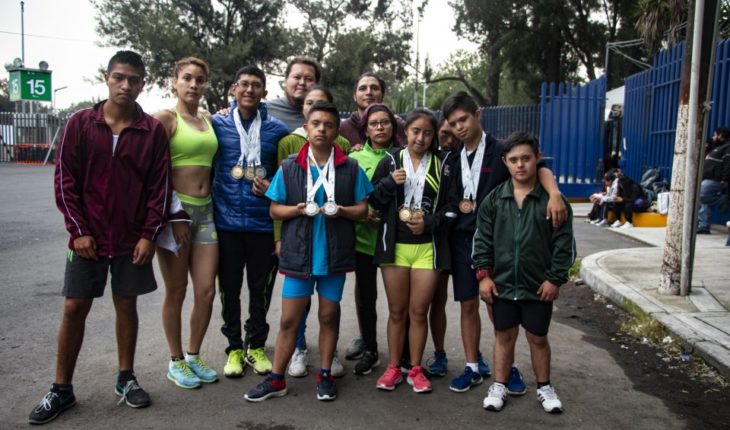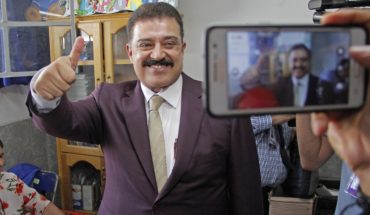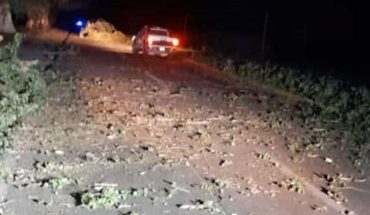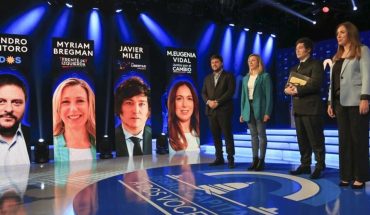Four years after an accident in which he lost his leg, Gustavo Estrada again felt “butterflies” in his stomach when he put on the prosthesis and took his first steps without the help of crutches.
“I walked ten meters and fell ten times,” laughs the young man from a neighborhood of Iztapalapa in Mexico City.
After each stumble, Gustavo narrates that he got up again and again, until both legs, bone and muscle legs, and titanium legs and shock absorbers, began to move at the same speed as the heart pumped blood and air was entering and leaving his organism po r stress fatigue.
It was only a few seconds, but this time it wasn’t a dream: Gustavo could run.
Reads: ‘It’s daunting’: Conade reduced medal-winning Olympic and Paralympic athlete scholarships
“He ran and cried at the same time,” she recalls even with the emotion in her black eyes. I never imagined I’d do it again.”
That day, something as simple as feeling again the blow of the air in the face of the orchestrated movement of a pair of legs, aroused in Gustavo a passion that he did not know until then: athletics.
Awkward movements soon began to become agile and safe. And of the ten meters of the first day he went to his first kilometer. Then at five, ten, 15, so, until, with a lot of training, he reached the first goal: to run in state competitions.
Now, he says while adjusting his hair in a bun that looks ‘samurai’ style and completes a few stretches before starting his day-to-day training at the National High Performance Center (CNAR), in mind he has fixed another dream: climbing level and representing Mexico at a Paralympic Games.
Although the story isn’t as pretty as it reads. Gustavo already participated in national competitions, but has no more support than the help of the company that, altruistically, donated the expensive titanium prosthesis – which resembles the one popularized by the South African former Paralympic athlete Oscar Pistorius -, and the guide to Emmanuel Badillo, his coach. Everything else, i.e. equipment, footwear, food, combis transport to training, trips to competitions, and so on, is on your own.
For this reason, the young man alternates daily training with his work in a mechanical workshop, which in turn complements with the sale of pallets aboard the minibuses that circulate in his neighborhood in Iztapalapa, where he dodges the assaults in one of the most violent demarcations of the Mexican capital.
You may be interested: Athletes with intellectual disabilities, medals and obstacles
“I’ve been looking for support to keep competing, but they don’t open the doors,” laments Gustavo, who says he sold some belongings to raise money.
“They tell me that there is no budget in the government,” adds the young man, who puts both hands in the pockets of the grey sweatshirt you wear, and then explains that he also asked for support that does not reach the authorities of his mayor’ in Iztapalapa.
“After the accident, I was able to stay on the floor and let myself go,” he reflects with his gaze fixed on the titanium leg. But something so painful changed my life for the better. Now, thanks to athletics, I’m getting ahead of myself. That’s why I don’t care if they tell me there’s no props. I’ll keep training until my chance comes.”
Photo: Elizabeth Cruz
There’s no money to pay the electricity bill
When Gustavo was told there was no money, they weren’t lying to him. The former director of the National Commission for Physical Culture and Sport (Conade), former Olympic athlete and medalist Ana Gabriela Guevara, said publicly in July this year that the Commission was in “red numbers” and that she had no funds to pay for services as well basics like the electricity bill.
The cap, Guevara said, was due to two factors: one, because in 2019 there was a reduction in budget, so expenditures had to be adjusted and staff reduced. And two, to the corruption of past governments.
“Athletes went to the direction (of the Count), knocked on the door, and were given what they asked for. There was a brutal discretion for tickets, camps, escorts, and it was an excessive expense. Today we don’t have it and it forces us to adjust,” Guevara stressed.
Even before that year, the Conade had already noticed that it was doing a “restructuring” in the grant allocation procedure because it detected inconsistencies from athletes who are no longer active or who did not meet the results that the regulations state, “and that they still continued to receive support, without a technical support to support it.”
For this reason, the award of scholarships and also the amount, which was reduced to two thousand pesos per month, which, in Guevara’s own words before the press, was understood and accepted by some athletes, while others devoted themselves to “making their tantrum” in the media .
Shortly thereafter, in September, the Federal Government tried to alleviate the impact of the cuts with an eye-catching measure: it invested some of the money it obtained from the auctions of property that belonged to organized crime in rewarding athletes who won medals in the Parapan American Games in Lima, Peru.
In total, President Andrés Manuel López Obrador distributed 100 million pesos in scholarships and stimuli for 184 athletes and 46 coaches.
Now, once the crisis has been over the crisis due to this year’s cuts, the Conade will have for the first time in seven years an increase in resources: the Chamber of Deputies approved 2,783 million pesos for the next 2020, up to one billion pesos more than this 2019 , although this increase may also be conditioned by the upcoming Olympic Games in Tokyo next summer.
Still, despite the increase in the budget, and the president’s scholarships, many athletes have to continue to use ingenuity to generate the resources that allow them to train and reach international competitions.
Athlete with down sells bracelets to keep training
Every Sunday, Kevin Macías, a high-performance athlete with down syndrome, wears tennis and puts on a Oackland Raiders cap, to get on with his grandmother to a combi in the State of Mexico and travel an hour and a half to Reforma.
There, in the Chapultepec metrobus station, next to the Torre Mayor, they improvise a stall of pulses and bags with chocolates on a bench.
Upon arrival, Kevin goes out to meet those who walk through Reforma to show them his yellow cardboard, in which he explains that, if they buy his products, they support him to continue his dream of being an athlete.
“I’m so proud of him…”
Dolores García, Kevin’s grandmother, sighs with a maternal smile as she prepares the chocolate bags that her grandson, in his eagerness to distribute them quickly, sometimes gives them to the public.
“It gives me pride in everything she has accomplished,” she adds, “and the desire she puts on her to continue her illusion of being an athlete in a world with so much discrimination.”
Read: Irregularities in Conade’s purchases and expenses detect
Kevin started playing sports at the age of eight, when a doctor warned him he was overweight. Disciplined, the boy asked his grandmother to enroll him immediately in a swimming course, but, once enrolled and wearing his swimsuit and hat ready, instructors told him they could not receive him.
They tried karate then, but the negative response was the same. So, after touring Mexico City in search of alternatives, Dolores found the opportunity at the Azcapotzalco mayoralty, where they invited Kevin to train and participate in local athletics races.
After winning the first medals – who wears a cheeky smile on camera – Kevin moved on to the team of Emmanuel Badillo, a coach with years of experience working with special athletes who has led to international competitions, such as Cinthya De Anda , who won for Mexico the bronze medal in the Parapan Americans of Lima in the 400-meter athletics event, and Alejandra Eloisa Mosquera, world champion Down of athletics.
Although Kevin is unable to attend the Tokyo Games, because there are no categories for Down athletes, his challenge is to participate in other international events, such as the Trisome Games, the equivalent of the Down Olympics that will take place next year in Antalya Turkey.
But, the money’s not enough. And that’s why you have to keep selling bracelets.
“Conade supports us very little. All we receive are the facilities of the National High Performance Center. But, there are no supports for food that a high-performance athlete should have,” Dolores laments.
“In addition, there are many competitions for which there is no help. It’s the moms who have to cover all the registration fees for the events, the sports uniforms, the transportation, the travels, everything,” he says.
Photo: Elizabeth Cruz
“Not enough budget”
In an interview with Animal Político, the Conade admitted that there is not enough budget to financially support all athletes with disabilities. Therefore, they have to prioritize scholarships among athletes who are shortlisted nationally, and who have already obtained certain levels of results in competitions such as the Parapan-Americans of Lima, or the Down world championship of athletics, which was held this year in Morelia, Michoacán.
However, María Trinidad González, technical secretary of the general management of the Conade, stressed that athletes who are not yet shortlisted and who are training to reach that level, such as Gustavo and Kevin, have other kinds of supports, even if they are not scholarships Economic.
For example, she pointed out the official, are given access to the facilities of the Mexican Paralympic Center (Cepamex), which is equipped with a gym, multipurpose courts, a launch and archery camp, and a semi-Olympic pool, and are allowed daily use of the national high performance track. In addition, they are granted insurance medical expenses and basic medicines, and a coach. All for free.
“We don’t close the doors to any athlete, although it is true that they will have to make an extra effort because they are still developing athletes,” said González, who explained that these athletes will get more benefits from the state as they scale their results. Meanwhile, economic support needs to be prioritized because the budget is “limited,” he insisted.
“We have to prioritize. And we know that this is a very complicated thing because everyone is great athletes and they all require the support. But the truth is that there are not enough resources and that’s why we’re trying to spread them out based on sports performance criteria.”
This task of prioritizing Gonzalez, has also implied that during the new management of Ana Gabriela Guevara had to “restructure” the scholarships and grants to avoid duplication – there were athletes who received scholarships from their state and also from the Federation – which is also generating many complaints.
“We are looking for alternatives for more people to have support, even if it is little money. So the idea is to remove the duplicity that we find when we arrive and try to put as requirements that, if someone already has a state scholarship, then leave the space for another athlete who does not have it.”
Coaches who don’t charge
In the parking lot of the National High Performance Center, in the Granjas México colony of Azcapotzalco, next to the Formula 1 circuit, a group of ten women wait for the end of the evening training of their children.
It is getting dark and many of them are talking to each other with visible signs of tiredness on their faces. There are yawns after a long day, one more, which began at seven in the morning, when their sons and daughters start the day for breakfast and then they start preparing for the training day.
Merle Durán, mother of Carlos Aarón Valencia Durán, an athlete with intellectual disabilities says that the race to high sporting performance is exhausting not only for athletes, but also for mothers who, like her, accompany them daily and bring them from the State of Mexico, Puebla or Querétaro, because the only high-performing Mexican Paralympic Center that exists in the country is that of the capital.
“The few supports they give us are very cut-out. Nothing is enough, because a conventional guy is supported and he moves on his own, he doesn’t need his mom, dad, or some family member. In our case, the need is greater because we always have to hang out with our guys and the cost doubles,” Merle says.
As for what the Conade has pointed out, about prioritizing scholarships among those who are getting good results in competitions, Carlos’ mother criticizes that they are in the middle of a meaningless cycle, since, if the athletes do not receive the government support, they will hardly be able to make the leap to high-performance competitions that, in turn, would give them access to the scholarships.
Coach Emmanuel Badillo admits that the Federal Government is making an effort to reward and encourage athletes who performed well in international competitions, such as the recent one in Lima.
However, in the same direction as Mrs Merle, she says that there are many other athletes such as Gustavo or Kevin himself who, although they have already had good results in national competitions, are staying out of aid, so they will hardly be able to go to international events.
“There is an attention of Conade, but when a result is already given. However, for the athletes who come from below there is not so much support,” says Badillo, who adds that the lack of support is not only suffered by athletes, but also by coaches, although, in his case, it is a regularity fala in paying his salary.
“Payment is never on time. I can tell you that, from January to date, I have not received a single weight,” stresses the coach, although nuance this is an old situation that has been dragging on from previous government.
“Working like this is very difficult,” he emphasizes. Because they’re asking for performance with the kids. But how they want us to give up if the salary doesn’t come to us regularly.”
Tokyo’s dream
A few meters from where Emmanuel chats, on the esplanade of access to the National High Performance Center, Carlos Aarón Valencia, a youth athlete makes stretches oblivious to all these problems and focused on a single concern: how to improve his times on the track.
Like many of his peers, he says his dream is to go to the Tokyo Paralympics next summer. Therefore, he completes long days of training in which, he says, his greatest fight is against himself.
“Many days I wonder, ‘What am I doing here? I’m tired and I don’t see any results.'”
But neither the lack of scholarships nor discouragement can’t with him, he says. And his coach Emmanuel has a lot to do with it.
“He helps me overcome those moments of slump,” Carlos says with a shy smile. He tells me that even if there are difficulties, I can achieve my goal. And I know I can make it, and that’s why I keep training. To make my mark and tomorrow say: I made it.”
What we do in Animal Político requires professional journalists, teamwork, dialogue with readers and something very important: independence. You can help us keep going. Be part of the team.
Subscribe to Animal Politician, receive benefits and support free journalism.#YoSoyAnimal
translated from Spanish: Athletes with disabilities look to reach Tokyo 2020
December 15, 2019 |





